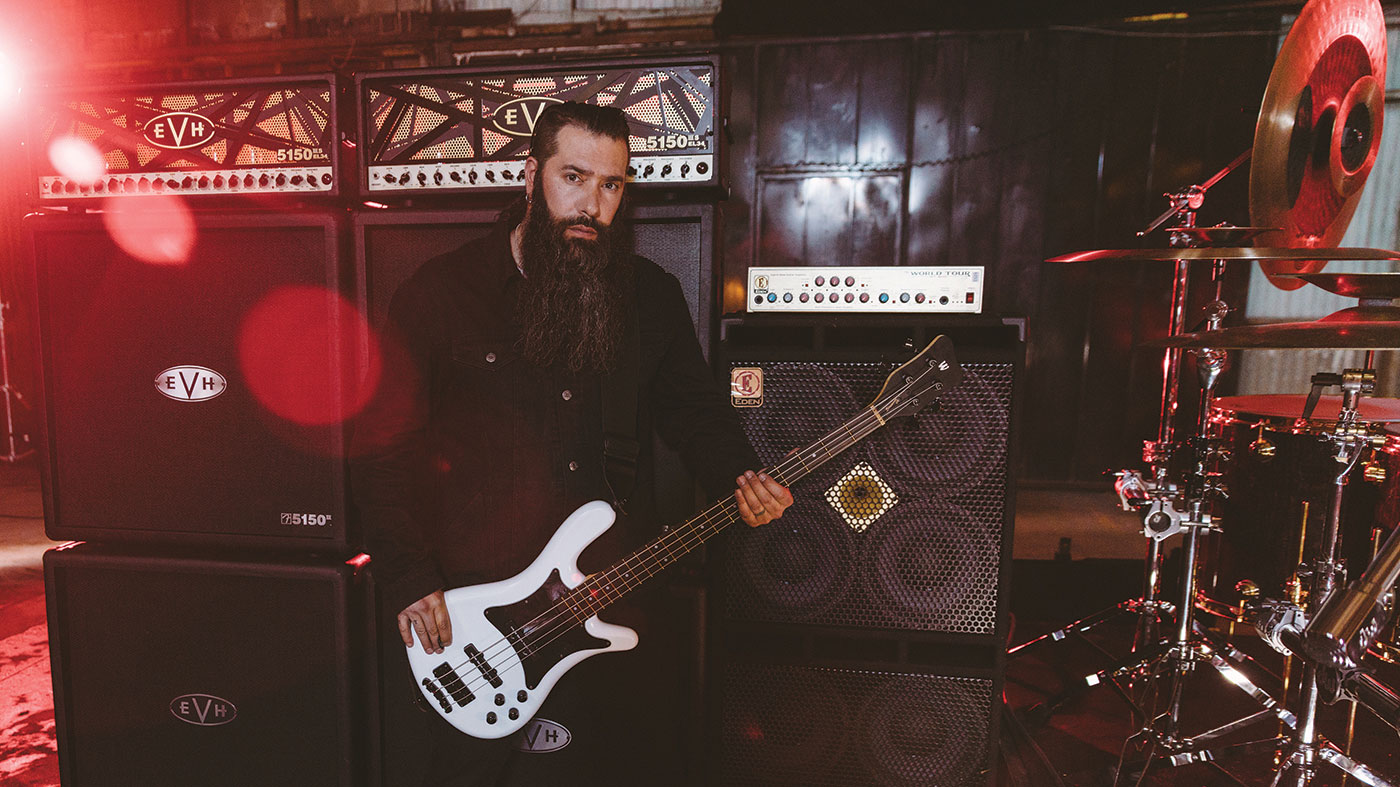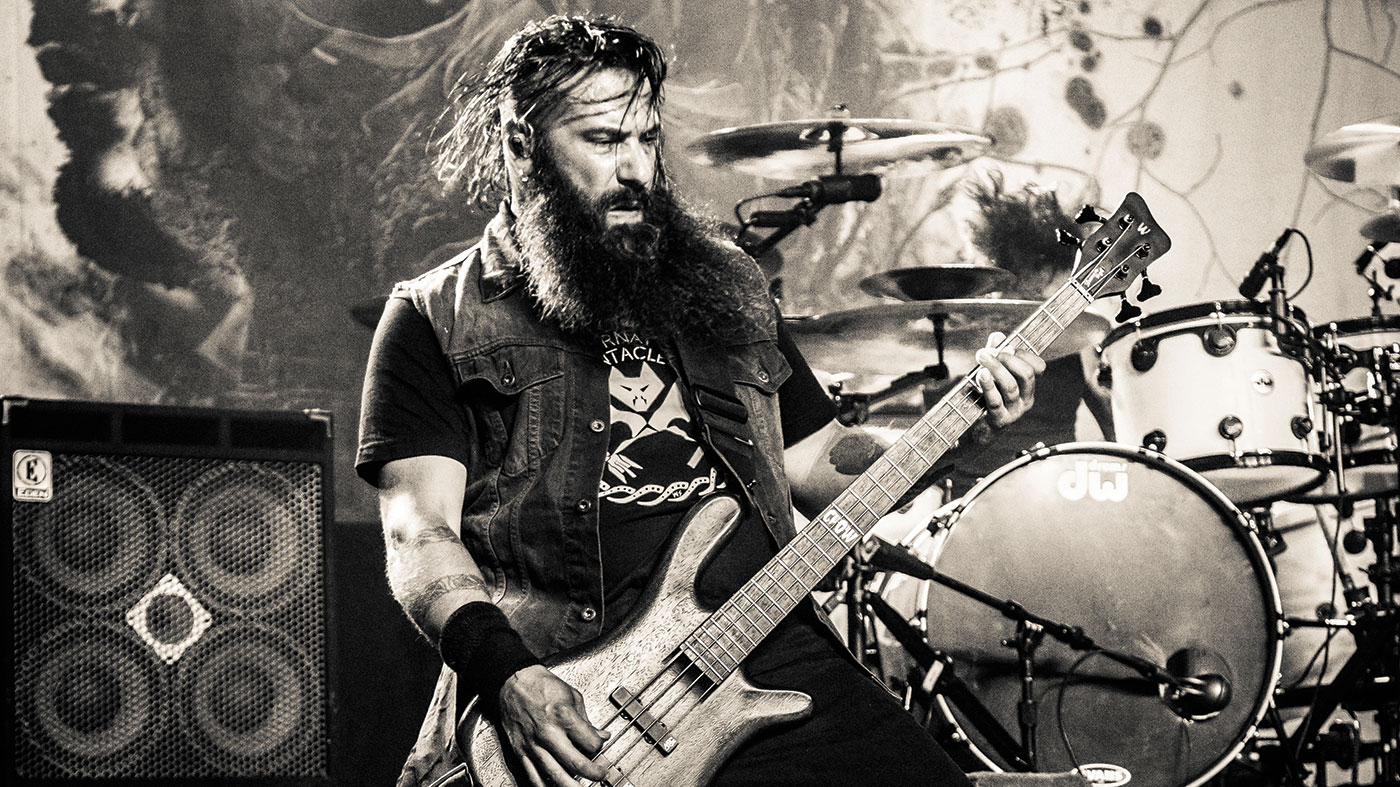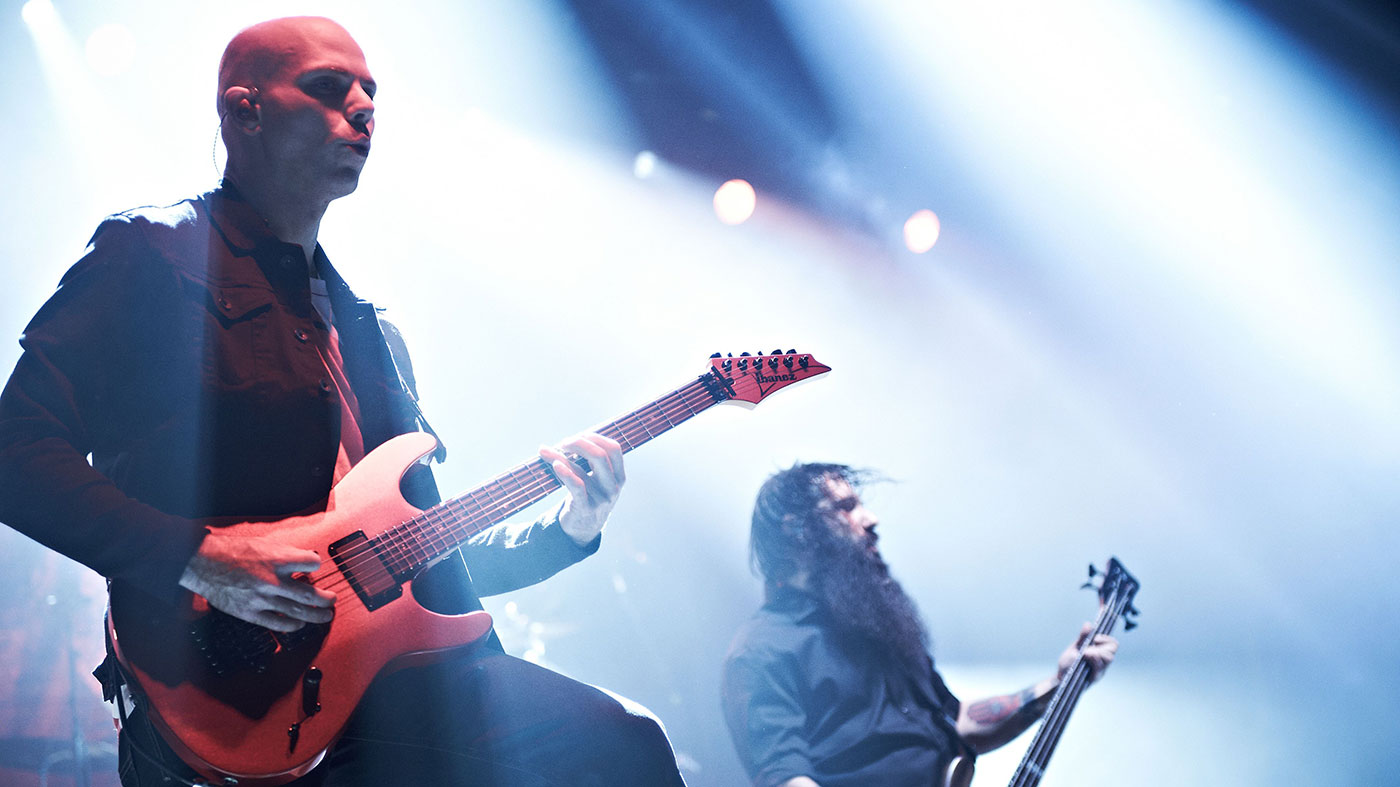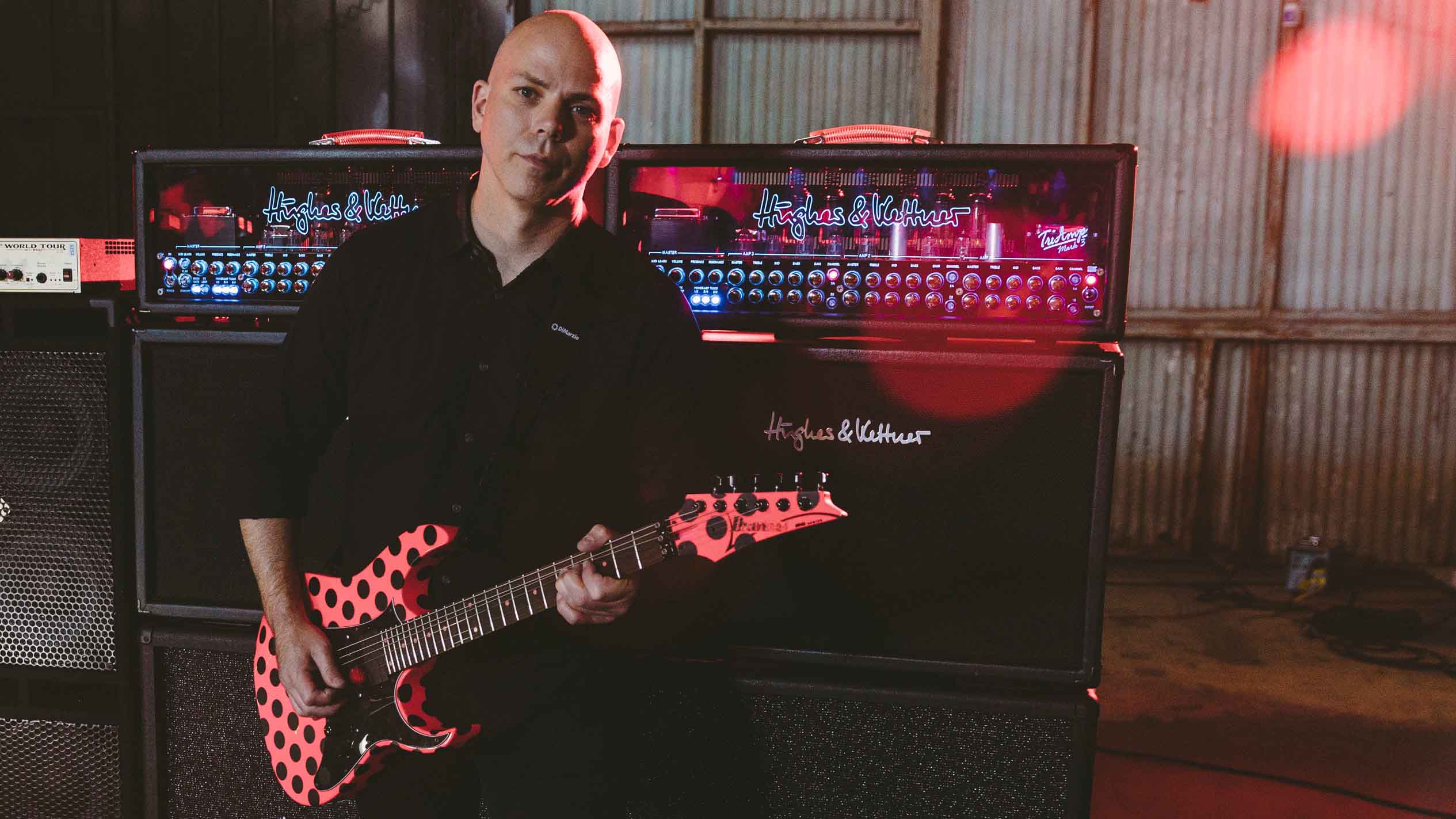Stone Sour's Johny Chow on his almighty bass tone and health advice for headbangers
Talking tone and technique with the formidable bassist

Introduction
Stone Sour, the Iowa-based rock band which rose to international fortune around 2002, got its start because it shared members, notably singer Corey Taylor, with Slipknot, a much heavier band whose success predated Stone Sour’s by a couple of years.
Nowadays, however, the newer band has reached a level of commercial success that comes close to rivalling that of the mighty ’knot, with a sixth studio album, Hydrograd, out as you read this.
Stone Sour has some heaviness to it as well as straight rock’n’roll, which I love
Bassist Johny Chow has enjoyed a long and prestigious career, firstly in the band Fireball Ministry, then in Cavalera Conspiracy alongside Sepultura and Soulfly frontman Max Cavalera, and now in Stone Sour. It’s been a pleasure to see him ascend the ladder of success, and his appearance in these pages is long overdue.
“We had a blast recording Hydrograd, and it really shows in the music, I think,” he tells us.
“We all busted our butts to make it as good as we possibly could! After the last tour I did with these guys in 2012, they asked me to be a full band-member, and obviously that was a no-brainer. I’d been hopping around from band to band for a while, and I’ve recorded some music with Cavalera Conspiracy and stuff like that, but Stone Sour has some heaviness to it as well as straight rock’n’roll, which I love.
“For the new album, we recorded everything live, which I haven’t done in years. It was awesome. We were all in a big room, just staring at each other’s ugly faces, and we were really able to groove off each other that way.”
Asked if he writes songs on bass, guitar or both, Chow explains: “It depends. A lot of time it’s on bass, and then it turns into a guitar riff when I throw it at Christian [Martucci, guitar] and he adds something to it. It works itself out.
“While Corey was away doing Slipknot in 2015, we decided that we were going to do two EPs of cover songs, but at the same time we started demoing our own songs too, whether it was songs from me or from Christian or Corey or Josh [Rand, guitar], however it played out. Sometimes a riff I write on guitar will turn into a bass-line, too.”
A dedicated Warwick endorser, he tells us: “Without mentioning any names, some of the companies I’ve been with before are guitar companies who happen to make basses, but Warwick is an actual bass company. They really put time, effort and passion into what they do. I’ve been to the Bass Camp over there and it was really cool - they get great bass players out there.”

Mosh medic
As we speak to Chow, he’s just moving from a particular bass preference to another.
“I’ve got a couple of neck-through custom basses, based on Warwick’s Streamer Stage II model, but I’m getting a couple more customs made for me at the moment. I’m going a slightly different way with the new ones.
“The current basses have bubinga and wenge in them, which are dense, heavy woods, so I wanted to switch it up a little this time and go back to what I grew up playing, which was Fender Precisions.
Because I already have active neck-through basses that are deep and punchy, I want to have something that’s a little more present
“I wanted that classic tone,” he continues, “so for the new basses I’m going with a swamp ash body, a maple bolt-on neck and a rosewood fretboard. They’ll still have the Streamer body shape, and they’ll be passive with a P/J pickup setup. I think they’ll suit Stone Sour really well, because the band isn’t all heavy - it’s a really versatile band.
“Because I already have active neck-through basses that are deep and punchy, I want to have something that’s a little more present. By that I mean I’d like a bass with a bit more character when it comes to tone - and it needs to have a tone which starts with the bass, rather than having to use a pedal.”
As you’ll see from the pictures of Chow, he enjoys what we used to call a ‘very metal’ stance on stage. Has this, plus those heavy wenge basses, taken its toll on his body over the years of touring?
“Oh yeah!” he winces. “These things are tanks, man. The way I stand means I have back problems. I have a very wide stance and I headbang a bit too, so when you throw all that in with a heavy bass, you’ll definitely need to come up with a remedy for some sort of ailment sooner or later. I’ve been having some sciatic issues, which kinda sucks, but it comes with age as well. The new custom basses are going to have a much lighter feel, which is good.”
Does he have any advice for the headbangers among us for whom a low bass and a vigorous mosh is all part of the job?
Johnny Araya came up with a strap system that attaches around the waist: it’s like a workout belt that weightlifters use
“Well,” he ponders, “Johnny Araya, who is the brother of [Slayer bassist] Tom Araya, came up with a strap system that attaches around the waist: it’s like a workout belt that weightlifters use. He basically took a straplock mechanism and put one on the bass and one on the belt.
“Your bass still balances out nicely on your shoulders because you’re still using the normal strap, but the belt moves all the weight of the bass onto the hips rather than on the spine, which causes the compression that really gets to you. Johnny should patent that and put it out there!”
As for amps, Chow is an Eden endorser, but took another route for the recording of Hydrograd.
“I used different amps, but the main one was a Frankbass, which belongs to Francesco Cameli, who is the engineer on the album and also the owner of Sphere Studios in Los Angeles, where we recorded. It’s a beautiful, amazing studio.
“A company out of the UK built him this bass amp, and it’s as simple as can be: I loved it. It just has a volume, a gain and a tone. All tubes, super warm. We tried it against three other bass amps, and it really came through.”

Live Chow
Live, Chow has landed on an efficient approach. “On stage, my tone basically comes off two direct pedals,” he says.
“I’ll forego the amp and the cab: instead, I have a setup where firstly I go into a tuner, which I use as a mute. I go from the tuner to an A/B box, which splits off to two MXR bass compressors.
“One of those goes into a Sansamp pedal and the other one goes into an MXR Bass M80 DI. I take directs off both of those and send them to the front of house, which takes care of any phasing issues you’d have if you were using amps. The chain is really simple and very clean and precise, without any extra crap in it.”
The chain is really simple and very clean and precise, without any extra crap in it
However, this setup is about to change, he adds. “I’m going to switch it up, actually: I’m still sticking with the pedals, but I’ve recently become a Darkglass artist. Man, those guys really know what they’re doing, and their new Alpha Omega Dual Distortion is amazing - Jon Stockman from Karnivool was part of the design team on that pedal.
“I used the Darkglass B7K to record the album, because the Alpha Omega wasn’t out yet. The B7K was my drive on all the songs: I didn’t even use the Sansamp, apart from a little bit of the plugin afterwards. The Alpha Omega is on my pedalboard now, along with the Sansamp and a prototype that Eden gave me called the Terranova, which has an amazing clean tone - big and boomy. Those three pedals will be responsible for my tone when we go on tour.”
Hydrograd is full of great bass moments, so expect to see plenty of tasty playing from Chow next time you see Stone Sour play live. One of the songs, Rose Red Violent Blue has an especially memorable line, we tell him.
“Thanks, man! We all threw ideas at each other and that one was Corey’s idea. It was very mellow at first, just an acoustic song, so I was sitting there thinking ‘What the hell am I going to play on this?’ When it picks up in the chorus, it has the same Cheap Trick and Foo Fighters kind of vibe that Song #3 also has, so I wanted to take it away from that.
“In my mind I was thinking of The Police, that kind of vibe. I grew up loving The Police; I saw Sting on TV, playing at the Bataclan in Paris, and every single song he played was a hit! He’s an amazing bass player.”
I physically stretch my neck, my back and basically my whole body, because I’m 45 and if I don’t do that I’ll hurt myself!
We’ll let him go in a minute, but first, does he have any tips for bassists who want to stay sane on tour? “Make sure you warm up, mentally and physically,” he warns.
“I keep a bass in the dressing room, and I’ll play it here and there throughout the day, but at least an hour or an hour and a half before we hit the stage, we clear out the dressing room and I play it seriously.
“Much as I hate to do it, we try not to have any guests back there at that time because we’re all trying to get our heads ready for the show.
“I’ll warm up by playing the bass like crazy, just playing scales: I don’t necessarily go over the actual songs, I just run my hands back and forth up and down the neck. Then I physically stretch my neck, my back and basically my whole body, because I’m 45 and if I don’t do that I’ll hurt myself! It’s a pretty good stretching regimen, right before we go on. This time around, I’m going to start stretching afterwards as well.”
One final tip for bassists of a more spiritual bent. “We’re thinking of doing a yoga class every day: whoever wants to join in - crew, band, it doesn’t matter - we’re going to do it every morning. It gets you in a good space, mentally and physically.” Get your mats out: we’ll see you there.


